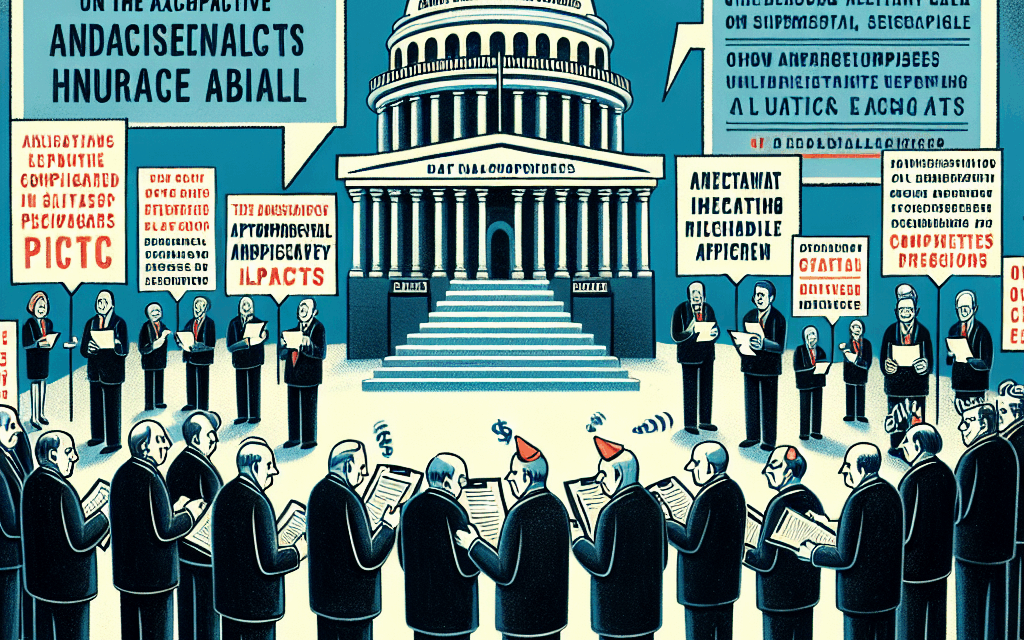State Exchange Directors Call on Senate to Reevaluate GOP Megabill, Highlighting Risks to ACA Enrollees
The Affordable Care Act (ACA) has been a cornerstone of healthcare reform in the United States since its enactment in 2010. However, recent legislative efforts, particularly the GOP Megabill, have raised significant concerns among state exchange directors regarding the potential risks to ACA enrollees. This article delves into the implications of the GOP Megabill, the responses from state exchange directors, and the broader impact on healthcare access and affordability for millions of Americans.
Understanding the GOP Megabill: An Overview
The GOP Megabill, a comprehensive piece of legislation proposed by Republican lawmakers, aims to overhaul various aspects of the ACA and related healthcare policies. This bill encompasses a wide range of provisions, including changes to Medicaid expansion, subsidies for health insurance, and the structure of state-based health exchanges. The implications of such sweeping changes are profound, particularly for those who rely on the ACA for their healthcare needs.
Key components of the GOP Megabill include:
- Medicaid Expansion Rollbacks: The bill proposes to limit Medicaid expansion, which has been a critical lifeline for low-income individuals and families.
- Subsidy Adjustments: Changes to the income thresholds for subsidies could result in higher premiums for many enrollees.
- State Exchange Modifications: The bill seeks to alter the operational framework of state-based health exchanges, potentially undermining their effectiveness.
- Insurance Market Reforms: Provisions that could allow insurers to offer less comprehensive plans, impacting coverage quality.
- Funding Cuts: Reductions in federal funding for health programs that support ACA enrollees.
These components have prompted state exchange directors to voice their concerns, emphasizing the potential negative consequences for millions of Americans who depend on the ACA for affordable healthcare.
The Role of State Exchange Directors
State exchange directors play a crucial role in the implementation and management of health insurance marketplaces established under the ACA. They are responsible for ensuring that these exchanges operate effectively, providing access to affordable health insurance options for residents. Their insights and experiences are invaluable in understanding the potential impacts of legislative changes like the GOP Megabill.
Key responsibilities of state exchange directors include:
- Enrollment Management: Overseeing the enrollment process to ensure that eligible individuals can access coverage.
- Consumer Education: Providing resources and information to help consumers navigate their health insurance options.
- Collaboration with Insurers: Working with insurance companies to offer a range of plans that meet the needs of enrollees.
- Data Analysis: Analyzing enrollment data and health outcomes to inform policy decisions and improve services.
- Advocacy: Representing the interests of enrollees and advocating for policies that enhance access to care.
Given their expertise, state exchange directors have raised alarms about the GOP Megabill, highlighting specific risks that could arise from its implementation.
Risks to ACA Enrollees: A Closer Look
The potential risks posed by the GOP Megabill to ACA enrollees are multifaceted and could have far-reaching consequences. State exchange directors have identified several key areas of concern that warrant careful consideration.
1. Increased Premiums and Out-of-Pocket Costs
One of the most immediate concerns regarding the GOP Megabill is the potential for increased premiums and out-of-pocket costs for enrollees. Changes to subsidy structures could disproportionately affect low- and middle-income individuals, making healthcare less affordable.
For instance, if the income thresholds for receiving subsidies are lowered, many individuals who previously qualified for financial assistance may find themselves facing higher premiums. This could lead to a situation where:
- Individuals are forced to choose between essential healthcare services and other basic needs.
- Increased financial strain could lead to higher rates of medical debt and bankruptcy.
- Some individuals may opt to forgo coverage altogether, leading to increased rates of uninsured individuals.
Data from the Kaiser Family Foundation indicates that even a modest increase in premiums can significantly impact enrollment rates. For example, a 10% increase in premiums could lead to a 5% decrease in enrollment, which translates to hundreds of thousands of individuals losing coverage.
2. Disruption of Medicaid Expansion
The GOP Megabill’s proposed rollbacks of Medicaid expansion represent a significant threat to millions of low-income Americans who gained coverage under this provision. Medicaid expansion has been instrumental in reducing the uninsured rate, particularly in states that opted to expand their programs.
Key implications of Medicaid expansion rollbacks include:
- Loss of Coverage: Millions of individuals could lose their Medicaid coverage, leading to increased rates of uninsured individuals.
- Health Disparities: Vulnerable populations, including low-income families, people of color, and those with chronic conditions, would be disproportionately affected.
- Increased Emergency Room Visits: Without access to preventive care, individuals may rely more heavily on emergency services, leading to higher healthcare costs overall.
Research from the Urban Institute suggests that states that expanded Medicaid saw a 7% reduction in uninsured rates compared to non-expansion states. The rollback of these expansions could reverse these gains, exacerbating health disparities and increasing the burden on healthcare systems.
3. Erosion of Coverage Quality
Another significant concern raised by state exchange directors is the potential erosion of coverage quality resulting from the GOP Megabill. Provisions that allow insurers to offer less comprehensive plans could lead to a situation where enrollees face higher out-of-pocket costs and limited access to necessary services.
Key factors contributing to the erosion of coverage quality include:
- Short-Term Plans: The bill may encourage the proliferation of short-term, limited-duration plans that do not provide essential health benefits.
- Reduced Essential Health Benefits: Insurers may be allowed to exclude certain services, such as mental health care or maternity coverage, from their plans.
- Higher Deductibles: Plans with lower premiums may come with significantly higher deductibles, making it difficult for enrollees to access care when needed.
The National Association of Insurance Commissioners (NAIC) has expressed concerns that such changes could lead to a “race to the bottom” in terms of coverage quality, ultimately harming consumers who rely on comprehensive health insurance.
4. Impact on Health Equity
The potential impact of the GOP Megabill on health equity is another critical area of concern. State exchange directors have emphasized that the proposed changes could exacerbate existing disparities in healthcare access and outcomes, particularly for marginalized communities.
Factors contributing to health inequities include:
- Access Barriers: Changes to Medicaid and subsidy structures could create additional barriers for low-income individuals seeking care.
- Disproportionate Impact on Communities of Color: Minority populations are more likely to rely on Medicaid and ACA subsidies, making them particularly vulnerable to coverage losses.
- Increased Health Risks: Without access to preventive care, individuals may face higher rates of chronic conditions and poorer health outcomes.
A report from the Centers for Disease Control and Prevention (CDC) highlights that racial and ethnic minorities are more likely to experience barriers to healthcare access, leading to disparities in health outcomes. The GOP Megabill’s potential to exacerbate these disparities raises significant ethical concerns about the future of healthcare in the United States.
5. The Role of Advocacy and Public Response
In light of the potential risks associated with the GOP Megabill, state exchange directors have taken on an advocacy role, urging lawmakers to reconsider the implications of their proposed changes. Their efforts are crucial in mobilizing public support and raising awareness about the potential consequences for ACA enrollees.
Key strategies employed by state exchange directors include:
- Public Awareness Campaigns: Engaging in outreach efforts to educate the public about the potential impacts of the GOP Megabill on healthcare access.
- Collaboration with Stakeholders: Partnering with healthcare providers, advocacy groups, and community organizations to amplify their message.
- Direct Engagement with Lawmakers: Meeting with legislators to share data and personal stories that illustrate the importance of maintaining ACA protections.
Public response to the GOP Megabill has been mixed, with many individuals expressing concern about the potential loss of coverage and increased costs. Advocacy efforts by state exchange directors and other stakeholders will be critical in shaping the legislative discourse and ensuring that the voices of ACA enrollees are heard.
Conclusion: The Path Forward for ACA Enrollees
The call from state exchange directors for the Senate to reevaluate the GOP Megabill underscores the urgent need to consider the potential risks to ACA enrollees. As the healthcare landscape continues to evolve, it is essential for lawmakers to prioritize the needs of vulnerable populations and ensure that access to affordable, high-quality healthcare remains a fundamental right.
Key takeaways from this discussion include:
- The GOP Megabill poses significant risks to ACA enrollees, including increased premiums, loss of Medicaid coverage, and erosion of coverage quality.
- State exchange directors play a vital role in advocating for the interests of enrollees and raising awareness about the potential consequences of legislative changes.
- Addressing health equity must be a priority in any healthcare reform efforts to ensure that marginalized communities are not disproportionately affected.
- Public engagement and advocacy will be crucial in shaping the future of healthcare policy and protecting the rights of ACA enrollees.
As the debate surrounding the GOP Megabill continues, it is imperative for all stakeholders to work collaboratively to safeguard the progress made under the ACA and ensure that all Americans have access to the healthcare they need.




